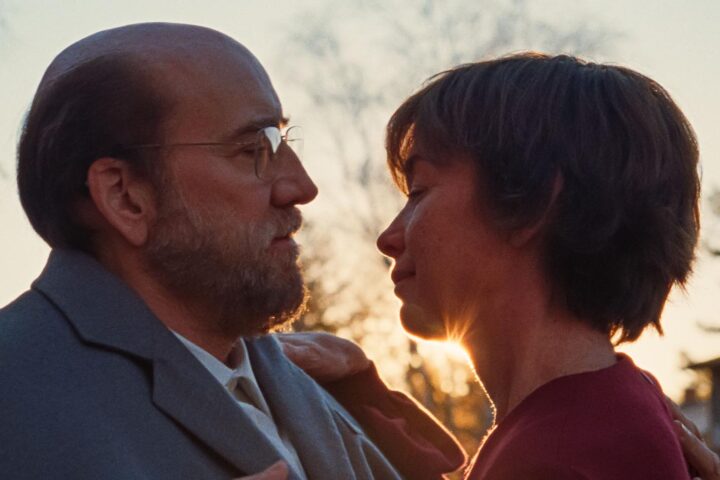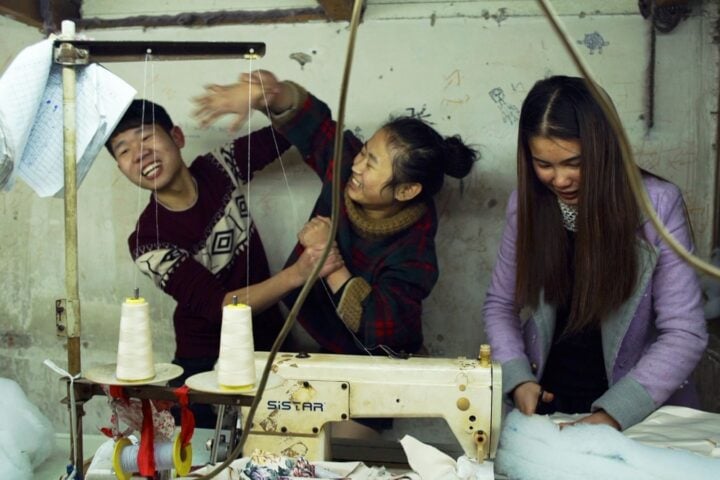Themes of aging have always undergirded Victor Erice’s work. His feature debut, 1973’s Spirit of the Beehive, is one of the finest of all coming-of-age films, capturing a few days in the life of a young girl as she struggles to understand, through nascent eyes, the evils and contradictions of life in Francoist Spain. Ten years later came El Sur, Erice’s famously incomplete adaptation of Adelaida García Morales’s novella, another story about a child who grows gradually aware of her country’s—and family’s—troubled past. And 1992’s The Quince Tree Sun saw Erice turn his attention more explicitly to art as a means of physical and spiritual preservation: the act of ossifying a moment in time in an attempt to stave off the inevitable.
Now, after three decades and a smattering of shorts (including a multipart collaboration with Abbas Kiarostami), Close Your Eyes marks the 83-year-old Erice’s return to—and reckoning with—feature filmmaking. Its opening scene, set in an ivy-ensnared chateau in rural 1940s France, seems of a piece with the rest of his work: softly lit, prudently edited, and shot on velvety celluloid. A wealthy, terminally ill Spanish-Jewish refugee hires an acquaintance to find his estranged daughter, wishing only to look into her eyes one last time.
Then, suddenly, it ends. This isn’t Close Your Eyes. Rather, it’s an excerpt from The Farewell Gaze, a film-within-a-film that was left unfinished in the early ’90s following the unexplained disappearance of lead actor Julio Arenas (Jose Coronado). In a stark, digitally shot 2012, the film’s aging director, Miguel Garay (Manolo Solo)—who, having long given up filmmaking, ekes out a quiet living in a coastal village as a literary translator—agrees to take part in a television special about Julio, thrusting himself back into a mystery he’s spent 20 years trying to forget.
There are mysteries at the heart of all of Erice’s features, shadows of elaborate, thorny histories into which viewers are offered only a pinprick of insight. On its most basic level, Close Your Eyes functions as a stirring detective story. Miguel’s reexamination of Julio’s mysterious disappearance reunites him with several people from their shared past, through whom new clues and interpretations about what happened to Julio begin surfacing.
The film quickly assumes a methodical cadence: Miguel and one other character will have a protracted conversation about Arenas while simultaneously litigating matters of life, death, love, and art. These scenes, in their patience, illuminate Erice and co-writer Michel Gaztambide’s true interests, which lie not in unspooling Julio’s past so much as in reckoning with the ways those connected to him have also, in their own manner, begun fading away.
A sting of pessimism colors the first half of Close Your Eyes, not least because of its openly autobiographical, self-referential bent. Erice, too, is someone for whom filmmaking has meant a good deal of trouble, and who’s been granted precious few opportunities to create and hone his art. Consequently, that art underwent a shift in perspective: Where once his films defined the unknown as a life not yet experienced, Close Your Eyes interprets it as a life already lived, slowly dissolving into memory. Erice’s protagonists are no longer children, but aging artists who are, if not bitter about their work, unsure of what it’s amounted to.
Miguel’s longtime friend Max (Mario Pardo), who edited what was shot of The Farewell Gaze, laments the declining popularity of celluloid film projection. And Arenas’s daughter, Ana (poignantly played by Ana Torrent, in her first collaboration with Erice since Spirit of the Beehive) finds that her work as a museum tour guide has rendered beauty a matter of routine. Close Your Eyes is a righteously frustrated film, though few of its admonishments are spoken above a whisper, and all serve to delicately underscore the humanity of its characters.
Somewhere along the way, Close Your Eyes starts shedding what tenuous attachments it had to a procedural structure in favor of something more oneiric and, in its own way, mysterious. The film’s central revelation begets several far murkier questions, and as Erice leans further into mapping the entanglements between cinema and memory, more light shines through its barbs.
There are passages of great beauty and tenderness here, notable among them a scene in which Miguel sings a rendition of “My Rifle, My Pony and Me” from Rio Bravo for his younger neighbors—a lively demonstration of what, perhaps, great art is all about. On occasion, this tenderness swerves just a hair too close to mawkish nostalgia, though every suggestion of cinema’s power to heal is counterbalanced with assertions of its ambiguity and unreliability. “Miracles haven’t existed in movies since Dreyer died,” opines Max at one point.
Across its 169 minutes, Close Your Eyes emerges as a work shockingly resistant to compartmentalization, appreciative both of cinema and its absence—all too fitting for a filmmaker whose career is as defined by the quality of his films as the long silences between them. Erice’s first feature begins with children in a theater and his last—for now at least—ends with adults in a theater, most of them old and gray, all hoping to rediscover something they’ve lost. A child, the only child in Close Your Eyes, stares back at them from the screen.
Since 2001, we've brought you uncompromising, candid takes on the world of film, music, television, video games, theater, and more. Independently owned and operated publications like Slant have been hit hard in recent years, but we’re committed to keeping our content free and accessible—meaning no paywalls or fees.
If you like what we do, please consider subscribing to our Patreon or making a donation.





